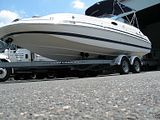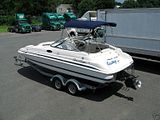Hello, all.
I'm a newbie to this excellent forum. I'm interested in replacing my 1978 19' Baja bowrider/ski boat with a 22' - 26' boat (deck boat most likely). I've read many of the boat threads from new boat owners (or prospective new boat owners) seeking help in deciding what kind of boat to buy and what manufacturer do you all recommend. All the discussions and recommendations were prefaced with knowing the purpose of the boat. Newbies all want a boat that is all things to all people for all purposes, but we know that no such boat exists. FYI, I'm not new to power-boating, but I've been away from it for a while as I've spent more time over the last ten years sailing on Lake Michigan in a 48 ft yawl than power-boating.
I, too, am looking for a multi-functional boat, primarily for cruising, fishing, entertaining and some water sports (but at 55 yoa, my slalom water-skiing years (days) may be numbered). A deck boat seems a good choice for me, my wife, our dog and our friends. For all intents and purposes, this will be a fresh water boat.
Consequently, I've been trying to research the current state of boat manufacturing. I've read many threads on this site and have also been reading reviews from various "experts". I want to make sure my boat purchase is from a quality manufacturer.
Sorry for taking the long way around the barn, but my research (and this forum) as raised a few questions about hull construction. I'd appreciate any help in resolving the following:
1. "Wood" in fiberglass hull construction v. "no wood" ?
Some commentors have recommended not using manufacturers that still use wood in constructing their fiberglass hulls. However, I've read many articles by David Pascoe about hull construction, although I have not yet read his last edition of "Surveying Fiberglass Power Boats" (it's on my 'to-do" list). David seems to be a knowledgable and reputable source on boat construction. He seems to endorse the use of balsa wood in hull construction over the use of composites for the following reasons, if my understanding of his articles are correct: a) "composites" mean different things to different manufacturers so the consumer (and even the boat surveyor) may not know what manufactured material is used to form the "composite" and b) due to hydrogen erosion et al, the real test for hull integrity is TIME and there has not been much research over time to ascertain if the composites will hold up as well as wood. [Note: David Pascoe himself acknowledges that 1) much of his information is 10 years or more behind the times simply because the boats he surveys tend to be at least that old before he is usually called in to survey them AND 2) he does not survey the typical recreational power boat because not many boat owners have their 20'-30' recreational power boats surveyed.]
Some forum participants have dissed the continued use of "wood" in hull frame construction while some manufacturers, like Ebbtide seem to boast this traditional method. What's the skinny?
2. Many of the recommended manufacturers, like Regal, Crownline, Chapparelle, Sea Ray, etc., use "chopper guns" in building their hulls. Again, David Pascoe does not recommend this method there is a greater probablilty of less structural integrity in the final product than in hand-laid fiberglass. If I recall correctly, David Pascoe attributed the source of many gel-coat blistering problems to this method of hull construction. Crownline boats, as well as others, was plagued with gel-coat blistering complaints...blistering problems that were not covered by the "limited lifetime warranties" of the manufacturers. Most all boat manufacturers gel-coat warranties expire after 5 years, but David Pascoe suggests that such problems may not show up until after the initial 5 year period and that before "chopper guns" and "composites" in hull construction, gel-coat blistering was extremely rare.
How much faith can I have in any hull made by a manufacturer using the "chopper gun" technique?
I appreciate any and all responses to my questions. Thank you in advance for your insights and perspectives on my issues. My apologies for my running-off at the keyboard.
narukami
I'm a newbie to this excellent forum. I'm interested in replacing my 1978 19' Baja bowrider/ski boat with a 22' - 26' boat (deck boat most likely). I've read many of the boat threads from new boat owners (or prospective new boat owners) seeking help in deciding what kind of boat to buy and what manufacturer do you all recommend. All the discussions and recommendations were prefaced with knowing the purpose of the boat. Newbies all want a boat that is all things to all people for all purposes, but we know that no such boat exists. FYI, I'm not new to power-boating, but I've been away from it for a while as I've spent more time over the last ten years sailing on Lake Michigan in a 48 ft yawl than power-boating.
I, too, am looking for a multi-functional boat, primarily for cruising, fishing, entertaining and some water sports (but at 55 yoa, my slalom water-skiing years (days) may be numbered). A deck boat seems a good choice for me, my wife, our dog and our friends. For all intents and purposes, this will be a fresh water boat.
Consequently, I've been trying to research the current state of boat manufacturing. I've read many threads on this site and have also been reading reviews from various "experts". I want to make sure my boat purchase is from a quality manufacturer.
Sorry for taking the long way around the barn, but my research (and this forum) as raised a few questions about hull construction. I'd appreciate any help in resolving the following:
1. "Wood" in fiberglass hull construction v. "no wood" ?
Some commentors have recommended not using manufacturers that still use wood in constructing their fiberglass hulls. However, I've read many articles by David Pascoe about hull construction, although I have not yet read his last edition of "Surveying Fiberglass Power Boats" (it's on my 'to-do" list). David seems to be a knowledgable and reputable source on boat construction. He seems to endorse the use of balsa wood in hull construction over the use of composites for the following reasons, if my understanding of his articles are correct: a) "composites" mean different things to different manufacturers so the consumer (and even the boat surveyor) may not know what manufactured material is used to form the "composite" and b) due to hydrogen erosion et al, the real test for hull integrity is TIME and there has not been much research over time to ascertain if the composites will hold up as well as wood. [Note: David Pascoe himself acknowledges that 1) much of his information is 10 years or more behind the times simply because the boats he surveys tend to be at least that old before he is usually called in to survey them AND 2) he does not survey the typical recreational power boat because not many boat owners have their 20'-30' recreational power boats surveyed.]
Some forum participants have dissed the continued use of "wood" in hull frame construction while some manufacturers, like Ebbtide seem to boast this traditional method. What's the skinny?
2. Many of the recommended manufacturers, like Regal, Crownline, Chapparelle, Sea Ray, etc., use "chopper guns" in building their hulls. Again, David Pascoe does not recommend this method there is a greater probablilty of less structural integrity in the final product than in hand-laid fiberglass. If I recall correctly, David Pascoe attributed the source of many gel-coat blistering problems to this method of hull construction. Crownline boats, as well as others, was plagued with gel-coat blistering complaints...blistering problems that were not covered by the "limited lifetime warranties" of the manufacturers. Most all boat manufacturers gel-coat warranties expire after 5 years, but David Pascoe suggests that such problems may not show up until after the initial 5 year period and that before "chopper guns" and "composites" in hull construction, gel-coat blistering was extremely rare.
How much faith can I have in any hull made by a manufacturer using the "chopper gun" technique?
I appreciate any and all responses to my questions. Thank you in advance for your insights and perspectives on my issues. My apologies for my running-off at the keyboard.
narukami






















